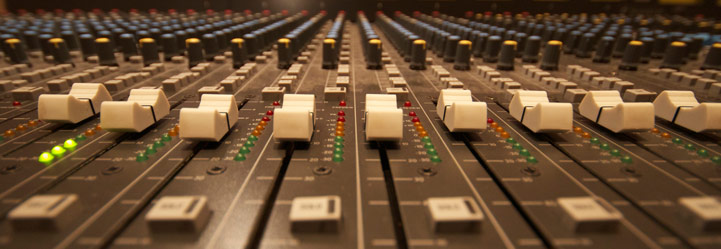COURSE SYLLABUS for FTV534 and FTV329 : Production and Set Management - Advanced Production Sound
 downloadable PDF
downloadable PDF
Course Information
COURSE: FTV534 Advanced Production Sound (On-Set Sound Recording for Film and Video)
INSTRUCTOR: Dr. Fred Ginsburg, C.A.S. Ph.D. MBKS
- (818) 231-1038 cell
- (818) 892-9236 fax
- This email address is being protected from spambots. You need JavaScript enabled to view it. or This email address is being protected from spambots. You need JavaScript enabled to view it.
MEETS: Foley Stage,Tuesdays 1:00-3:45 pm
TEXTS
Online multimedia coursebook: Craft of Production Sound, (www.FilmTVsound.com) published by EQE Media & Consulting Group. Includes numerous articles, tips, tricks, equipment reviews, tutorials, news, forum, calendar of events, and way more.
Purpose
To provide students with a basic understanding of the techniques and aesthetics of Production Sound Recording; along with its relationship to the sound design and overall production of the completed soundtrack for motion pictures and TV.
Emphasis will be given to the practical techniques and equipment operation as currently utilized on professional theatrical productions, and how those approaches can be utilized on productions of any scope — be they theatrical or non-theatrical, film or video.
Student Learning Outcomes
Students in this course will:
- Understand and articulate the history, theories and critical models of electronic media.
- Understand the fundamental concepts of pre-production, production and post-production in film/television production sound.
- Have an understanding of basic film/television Sound production principles, terminology, and procedures and use them in the assigned video projects. Including (but not limited to) proper rigging of lavalier mics, proper "over/under" coiling of audio cables, proper use of mixing panels, and proper use and identification of shotgun microphones.
- Understand the basic oral and written communication tools to function professionally in film/television Sound.
- Record and edit video production sound exercises. All students must be able to produce professionally acceptable audio CD's and standard video DVD's.
- Plan and properly budget for Production Audio.
Methods
Lecture, PowerPoint, guest speakers, demonstrations, and hands-on exercises. Realistic production situations will be simulated, explored, and discussed.
Topics
|
|
Requirements
- Classroom attendance & participation
- 3 quizzes & 1 major exam
- Completion of recording projects and budget project
- Students are to view & sign in to the class blog every week
Attendance
Students are expected to attend all classes and lab sessions. There will be NO MAKE-UP of lab assignments without prior consent of the instructor. Each undocumented absence will result in three points being deducted from the final grade. Each tardy will result in one point being deducted from the final grade. It is the responsibility of the student to notify me at the end of class if they were late, if not their tardiness will automatically count as an absence. Attendance is taken daily and it is the student’s responsibility to SIGN THE ATTENDANCE SHEET! These penalties are designed to encourage professionalism, participation and fair treatment for all. Disruptive, unprofessional behavior will be counted as an unexcused absence and will also entail written assignments as punishment.
IN THE EVENT OF ABSENCE, it is the student's responsibility to catch up on missed content and to arrange to take make-up exams.
Grading Criteria
Evaluation is based upon student performance in the following areas:
30% - Major Exam (approx 65 questions, covering entire semester)
30% - Quizzes (short answer, multiple choice).
40% - Projects (spaced throughout semester, including:
- ENG style interview
- Dramatic production mix or Production audio from Cycle or 1,2,3
- Budget plan
Written summaries and log sheets to be submitted with recorded exercises. Project descriptions and requirements are described later in the Projects section.
Failure to view and reply to the online class blog may result in the loss of one grade point for each week's non-compliance.
Letter grades are derived from the following table, based on 100 total points possible:
| A = 93-100 | B+ = 88-89 | C+ = 77-79 | D = 60-67 |
| A- = 90-92 | B = 83-87 | C = 70-76 | |
| B- = 80-82 | C- = 67-72 |
Classroom performance, professionalism, and optional projects will be considered to improve grades.
Except for extreme circumstances, students are expected to complete the requirements of this course by the last day of classes (official date of Final Exam). Projects are due not later than the last official day of instruction (which is one week prior to the official Final Exam Date). Students who have not taken all exams and turned in their projects may be subject to a failing grade.
Note that only projects which were turned in, graded/reviewed by Instructor, and returned to the student may be re-submitted for an improved grade as late as the Final Exam Day.
Students with valid reasons for not being able to complete the course may petition the Instructor, in writing, for an Incomplete. Requests for Incompletes must be submitted prior to the last day of classes. Students granted Incomplete grades are responsible for contacting the Instructor during the semester break but not later than one month after the start of the following semester in order to set up an arrangement and timetable.
Professionalism
Much of what the class does will involve group activity, use of sophisticated equipment, and interaction with industry professionals. Students are expected to display professional and courteous behavior towards people and equipment. Disruptive, unprofessional behavior in this class will not be tolerated. Irresponsible professional behavior that reflects negatively on the department may result in academic penalties; inappropriate behavior will be dealt according to the university regulations and be referred to the Dean of Students.
University Academic Integrity Policy
Chapman University is a community of scholars that emphasizes the mutual responsibility of all members to seek knowledge honestly and in good faith. Students are responsible for doing their own work, and academic dishonesty of any kind will not be tolerated anywhere in the University.
Use of computers and smart electronic devices
These devices are intended for note taking or as pertinent production equipment for in-class exercises. However, some students have used these devices to browse the internet, edit/screen videos, and perform distracting tasks not relevant to class activity. Such behavior will result in grade point deductions and the banning of electronic devices for the remainder of the semester. Under no circumstances may cell phones, cameras, and similar devices be within proximity of written tests. (Students with special emergency issues may arrange to leave their phones at the instructor’s desk.)
Feedback
You are all strongly encouraged to provide the instructor with your views about me, the course, or the department. Feel free to meet with me, phone, or even leave anonymous notes! Feedback helps all of us grow, students and faculty alike.
Problems, Questions, Etc.
Please, and I cannot stress this point enough, CALL ME! Confusion and logistical problems are natural, but curable. There is bound to be something in the readings or lectures that you are unsure about. During class, if I rattle off some industry jargon that you do not understand — interrupt me and ask. If you have any questions about the readings or lectures, problems with the assignments, need production advice, or whatever...THAT IS WHY I GIVE OUT MY PHONE NUMBER!
Office Hours
Being part-time faculty, on-campus meetings are in classroom or my office (MKS266, Adjunct Faculty Office) one hour prior to class, after class, or by appointment. Meetings can also be arranged on campus on other days if I am available.
MAILBOX: In MKS 266 (Adjunct Faculty Office)
Fees
Subscription to the online coursebook is only $25 for students, but that will give you access to texts and other materials that would cost considerably more if offered as pre-printed items. If you send me an email before your six month subscription expires, I will extend it a few years until you graduate at no extra charge. In addition, students may have to share the cost of recording stock and/or some equipment rental for their projects.
Students with disabilities
In compliance with ADA guidelines, students who have any condition, either permanent or temporary, that might affect their ability to perform in this class are encouraged to inform the instructor at the beginning of the term. The University, through the Center for Academic Success, will work with the appropriate faculty member who is asked to provide the accommodations for a student in determining what accommodations are suitable based on the documentation and the individual student needs. The granting of any accommodation will not be retroactive and cannot jeopardize the academic standards or integrity of the course.






